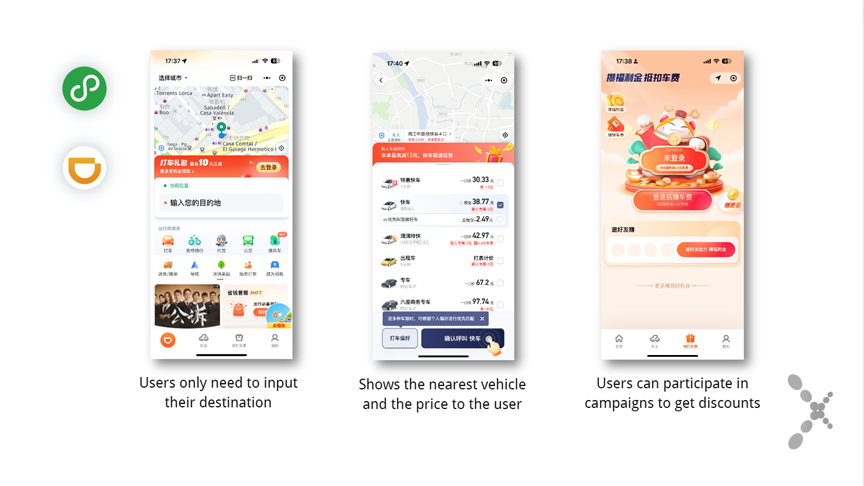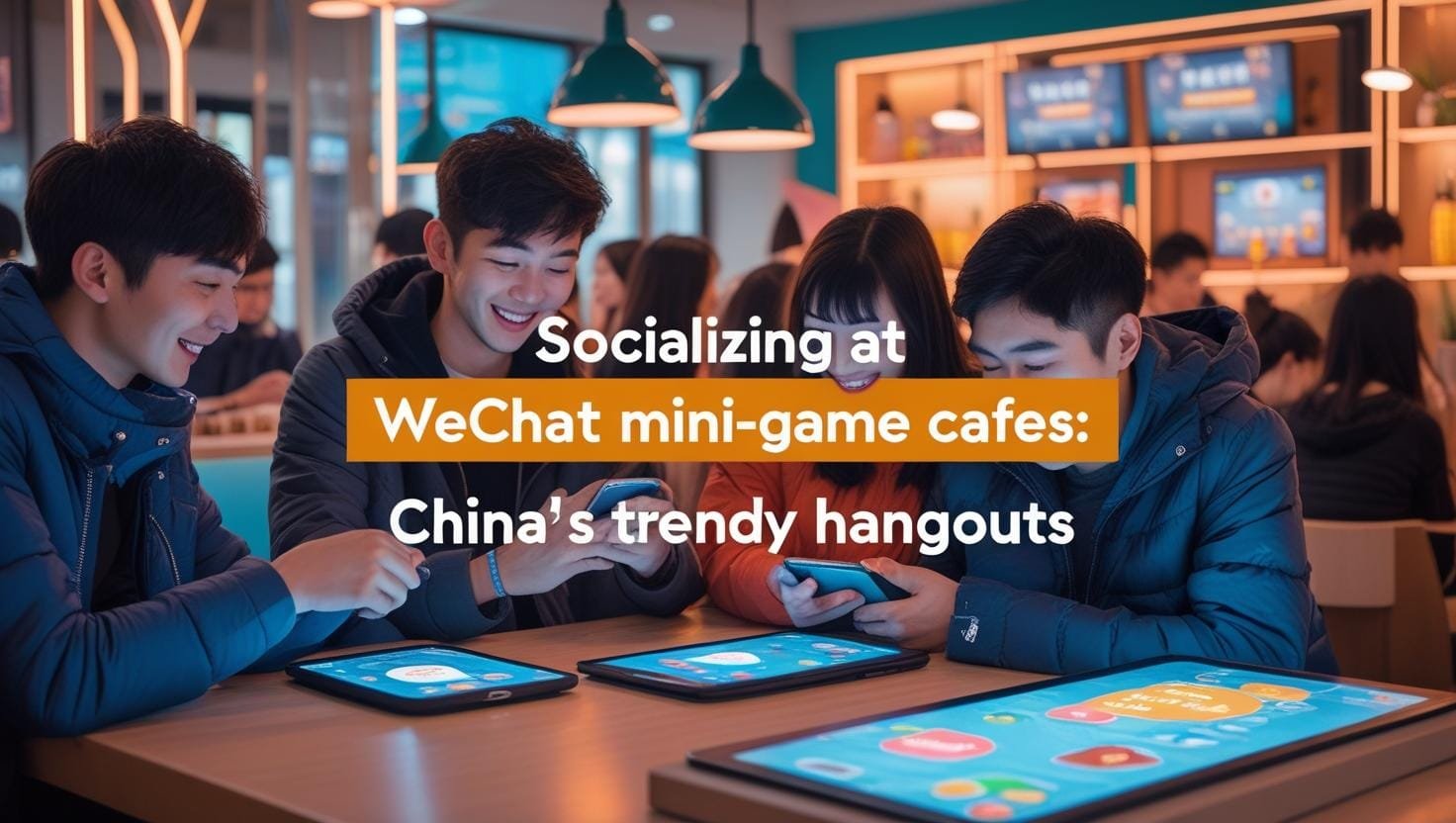Socializing at WeChat Mini-Game Cafes: China’s Trendy Hangouts
Planning a trip to China? Beyond exploring ancient wonders and savoring incredible cuisine, you might be curious about how young Chinese people socialize and what the latest urban trends are. Here at jusha.travel, we love sharing tips to make your China journey unforgettable, and today, we’re diving into a fascinating aspect of modern Chinese urban life: WeChat Mini-Game Cafes. These vibrant spaces are quickly becoming the go-to spots for friends to connect, compete, and unwind, offering a unique glimpse into China’s dynamic social landscape. If you’re keen to experience the authentic local socializing China has to offer, understanding these cafes, powered by innovative WeChat mini-programs, is a must. They perfectly blend the ubiquitous influence of China’s leading super-app with the country’s evolving China cafe culture, reflecting the vibrant urban lifestyle China
has to offer. So, grab your virtual passport as we explore this exciting phenomenon, a true testament to how technology and community intertwine in the Middle Kingdom.
 The Digital Heartbeat: Understanding WeChat Mini-Programs
The Digital Heartbeat: Understanding WeChat Mini-Programs
Before we dive into the buzzing atmosphere of these cafes, it’s essential to grasp the technology that powers them: WeChat mini-programs. What exactly are they? Imagine apps that don’t need to be downloaded or installed separately. They live within the WeChat ecosystem, China’s all-encompassing super-app used for everything from messaging and payments to hailing taxis and booking appointments. These “apps within an app” are lightweight, fast-loading, and incredibly convenient. For travelers relying on China travel apps, WeChat is already indispensable, and mini-programs extend its utility exponentially. This innovation allows users to instantly access a vast array of services, including, you guessed it, games!
The concept of WeChat mini-programs has revolutionized the digital landscape in China. They significantly reduce the friction associated with discovering and using new services. Since their inception, mini-programs have seen explosive growth across various sectors, particularly gaming. As per Kivisense, a prominent name in WeChat mini-program development, these mini-apps have truly become a cornerstone of daily digital life in China, making it easier for users to engage with a wide range of content without ever leaving the familiar WeChat interface. This seamless integration is what makes these mini-game cafes possible and so popular, fostering an environment where digital interaction easily transitions into real-world connection.
 The Rise of WeChat Mini-Game Cafes
The Rise of WeChat Mini-Game Cafes
The transformation of China’s digital habits, heavily influenced by mobile technology, has led to fascinating developments in its social spaces. While traditional internet cafes (or “wangba”) have been prevalent for decades, WeChat Mini-Game Cafes represent a fresh, modern evolution, perfectly aligning with contemporary China cafe culture. These aren’t just places to grab a coffee; they are dynamic social hubs where the digital world of WeChat mini-games merges seamlessly with real-life interaction. They epitomize a burgeoning trend in urban lifestyle China, catering to a generation that values instant connectivity and shared experiences.
The growth of WeChat mini-games has been nothing short of phenomenal. In the first half of 2024 alone, mini-games generated an astonishing $2.3 billion in revenue, marking a 60% increase compared to the previous period, as reported by Pocket Gamer. The broader mini-game market reached 38.9 billion yuan (approximately $5.4 billion) in revenue for 2024, demonstrating a year-on-year growth of 99.1%. This surge in popularity has directly fueled the emergence of dedicated physical spaces like mini-game cafes. These venues specifically invite patrons to gather, play, and engage with the most popular WeChat mini-games, which are typically easy to learn and highly shareable, fostering casual competition among friends and strangers alike, according to Statista’s insights on popular WeChat mini-games.
For visitors keen on understanding local socializing China, these cafes offer an authentic window. Friends gather, not just to spectate, but to actively participate, often forming teams, competing on leaderboards, and even joining casual tournaments. This setup leverages WeChat’s social features, allowing players to instantly share achievements, invite friends, and discover new games. It’s a testament to how online platforms are creating new forms of offline community, offering a vibrant alternative to traditional entertainment venues and reflecting the integrated nature of modern Chinese life.
 Gaming & Socializing: The Best of Both Worlds
Gaming & Socializing: The Best of Both Worlds
At the heart of the appeal of WeChat Mini-Game Cafes is the unique blend of digital gaming and real-world connection. Unlike isolated mobile gaming at home, these cafes transform casual play into a communal event. This environment is particularly attractive to China’s youth, who are adept at navigating the digital world while still valuing face-to-face interaction. It’s where urban lifestyle China truly shines, showcasing a generation that seamlessly integrates technology into their social fabric.
Consider the typical scene: groups of friends huddled around tables, their phones in hand, but their attention frequently shifting to their companions. They might be laughing over a failed attempt in a puzzle game, cheering on a teammate in a collaborative challenge, or engaging in playful banter during a competitive round. The direct integration with WeChat mini-programs means that players can easily:
- Compete directly against friends: Many mini-games feature real-time multiplayer options or leaderboards that encourage friendly rivalry.
- Collaborate on challenges: Some games require teamwork, fostering cooperation and communication amongst players present at the cafe.
- Share achievements instantly: Scores and victories can be immediately shared within WeChat, prompting reactions and further interaction.
- Discover new games together: Friends often recommend popular titles, leading to group exploration of trending mini-games.
This social dynamic isn’t just organic; it’s a carefully cultivated experience. The cafes themselves are designed to facilitate this interaction, often with comfortable seating arrangements, large screens displaying leaderboards, and sometimes even themed interiors. The focus is on creating a “third space” – beyond home and work – where individuals can relax, have fun, and strengthen their bonds. This phenomenon is a prime example of local socializing China, illustrating how digital platforms, particularly China travel apps like WeChat for foreign visitors, are shaping new cultural practices and leisure activities. It’s an exciting evolution of China cafe culture, proving that even in a digital age, there’s a strong desire for shared, tangible experiences.
 More Than Just Games: The Mini-Game Economy and its Impact
More Than Just Games: The Mini-Game Economy and its Impact
The popularity of WeChat Mini-Game Cafes is not just a social phenomenon; it’s also a significant indicator of the depth and breadth of China’s digital economy. These cafes stand at the intersection of entertainment, technology, and commerce, powered by the vast ecosystem of WeChat mini-programs. For anyone interested in the nuances of urban lifestyle China, understanding the economic engine behind these trends is crucial.
The mini-game sector within WeChat is a booming industry. Advertising on WeChat mini-games, for instance, surged by 113% year-over-year in 2024, as highlighted by Marketech APAC. By October 2024, over 19,900 mini-games were running ad campaigns, nearly double the previous year, with ad creatives reaching an astounding 3.7 million. This reflects how developers are increasingly leveraging this platform for monetization, either through in-game purchases or through advertising, making game launches into WeChat mini-game communities a lucrative strategy.
This vibrant economic activity has several implications beyond the digital realm. The success of WeChat Mini-Game Cafes demonstrates how digital services can drive physical traffic and create new business models. These cafes not only profit from food and beverage sales but also benefit from the foot traffic generated by the allure of popular mini-games. They become a hub where consumers spend both their digital currency (through in-game purchases facilitated by WeChat Pay) and their physical money. This seamless integration of online and offline transactions is a hallmark of modern Chinese commerce and is something visitors will encounter frequently when using China travel apps.
Moreover, these cafes reflect broader trends in China cafe culture, where venues increasingly offer more than just coffee. They provide unique experiences, fostering community and catering to specific interests. This commercial success, intertwined with the casual and competitive nature of the games, makes WeChat Mini-Game Cafes a compelling case study of how technology reshapes contemporary local socializing China. They signify the power of an interconnected digital ecosystem to spawn new forms of urban leisure and economic opportunity.
Conclusion
From the bustling streets of Beijing to the vibrant lanes of Shanghai, WeChat Mini-Game Cafes offer a fascinating window into modern urban lifestyle China. They perfectly encapsulate how innovation in WeChat mini-programs has not only transformed digital interactions but also reshaped the physical spaces for local socializing China. These cafes are more than just places to play games; they are dynamic community hubs where friends connect, compete, and share experiences, reflecting a unique fusion of technology and tradition within China cafe culture.
For anyone planning a trip to the Middle Kingdom, understanding the pervasive influence of China travel apps like WeChat is essential. Venturing into a WeChat Mini-Game Cafe offers an authentic, fun, and engaging way to experience contemporary Chinese youth culture firsthand. It’s a testament to China’s forward-thinking approach, where the boundaries between the digital and the physical continue to blur, creating exciting new avenues for interaction and enjoyment.
We hope this glimpse into China’s trendy hangouts has sparked your curiosity! Have you visited a WeChat Mini-Game Cafe, or do you have other unique social experiences in China to share? Let us know in the comments below! For more insights, tips, and inspiration for your next adventure, be sure to visit jusha.travel for comprehensive guides and articles. Safe travels!

